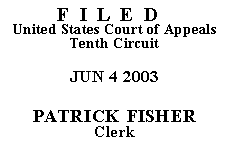

|
THURMAN HARRISON, JR., |
|
Before SEYMOUR, MURPHY, and O'BRIEN, Circuit Judges.
Petitioner, Thurman Harrison Jr., is before this court pro se, seeking a certificate of appealability ("COA"). Harrison must obtain a COA before he can appeal the district court's dismissal of the habeas petition he filed pursuant to 28 U.S.C. § 2254. See 28 U.S.C. § 2253(c)(1)(A) (providing that no appeal may be taken from the denial of a § 2254 petition unless the petitioner first obtains a COA).
Harrison was charged in Colorado with felony theft and fraud by check. Pursuant to the terms of a plea agreement, Harrison pleaded guilty to the felony theft charge and the remaining charge was dismissed. Harrison was sentenced to nine years' incarceration to be followed by a three-year term of mandatory parole. Harrison's application for post-conviction relief was denied by the Colorado Court of Appeals on February 24, 2000. The Colorado Supreme Court then denied Harrison's petition for a writ of certiorari.
Harrison filed his § 2254 petition with the federal district court on October 3, 2000. In the petition, Harrison raised five issues: (1) the indictment charged him with conduct that did not constitute a crime; (2) his due process rights were violated when the trial court failed to inform him of the three-year term of mandatory parole; (3) Colorado's mandatory parole statute, Colo. Rev. Stat. § 18-1-105(1)(a)(V)(A), is unconstitutional; (4) his due process and equal protection rights were violated when the trial court refused to provide him with a free transcript; and (5) his due process rights were violated at the sentencing hearing when the trial court failed to make findings justifying an aggravated-range sentence. The federal district court denied each of Harrison's claims on the merits.
This court cannot grant Harrison a COA unless he can demonstrate "that reasonable jurists could debate whether (or, for that matter, agree that) the petition should have been resolved in a different manner or that the issues presented were adequate to deserve encouragement to proceed further." Slack v. McDaniel, 529 U.S. 473, 484 (2000) (quotations omitted). In evaluating whether Harrison has carried his burden, this court undertakes "a preliminary, though not definitive, consideration of the [legal] framework" applicable to each of his claims. Miller-El v. Cockrell, 123 S. Ct. 1029, 1040 (2003). Harrison is not required to demonstrate that his appeal will succeed to be entitled to a COA. He must, however, "prove something more than the absence of frivolity or the existence of mere good faith." Id. (quotations omitted).
This court has reviewed Harrison's application for a COA and appellate brief, the magistrate judge's recommendation, the district court's order, and the entire record on appeal pursuant to the framework set out by the Supreme Court in Miller-El and concludes that Harrison is not entitled to a COA. The district court's resolution of Harrison's claims is not reasonably subject to debate and the claims are not adequate to deserve further proceedings.(*) Harrison, therefore, has not "made a substantial showing of the denial of a constitutional right." 28 U.S.C. § 2253(c)(2). This court denies Harrison's request for a COA for substantially those reasons set forth in the magistrate judge's recommendation for dismissal dated July 31, 2002 and the district court's order dated October 15, 2002, and dismisses this appeal. Harrison's request to proceed on appeal in forma pauperis is granted.
ENTERED FOR THE COURT
Michael R. Murphy
Circuit Judge
*.Although Harrison has not provided this court with a copy of the plea agreement, we note that he admitted before the Colorado Court of Appeals that in the agreement he expressly agreed to a sentence of nine years. Further, the Colorado Court of Appeals found that Harrison was advised in the plea agreement that he could be required to serve up to five years of mandatory parole. Harrison has failed to rebut the presumption of correctness afforded this finding. See 28 U.S.C. § 2254. ("[A] determination of a factual issue made by a State court shall be presumed to be correct. The applicant shall have the burden of rebutting the presumption of correctness by clear and convincing evidence."). Because the sentence Harrison received is less than twice the presumptive maximum, it was permitted by Colorado law and, therefore, is not an illegal sentence. See Colo. Rev. Stat. § 18-1-105(6) (2000).